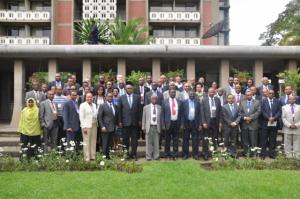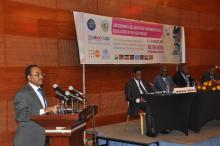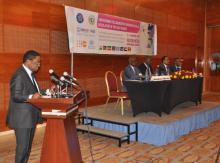IGAD Countries Sign Call for Action for Regional Medicine Regulation, Harmonization
The Inter-Governmental Authority on Development (IGAD) member states have signed a call for action to establish a regional medicine regulation collaboration and harmonization mechanism to fight illicit medicine circulation and improve availability of safe, effective and quality-assured medicines. Substandard/spurious/falsely labelled/falsified/counterfeit (SSFFC) medical products cost the lives of many people in the region.
This important decision was made after member states deliberated in the first IGAD Conference on Regulatory Collaboration and Harmonization held in Addis Ababa on 3-5 August 2015.
The call for action recommends several activities to be accomplished by the IGAD Secretariat, by member states and partners to provide improved access to safe, effective and quality medicines through harmonized regulatory systems.
It recommended, among others, to form an IGAD steering committee composed of heads of medicine regulatory authorities of member states and also a technical working group of experts that reports to the steering committee. It also suggested establishment of an office within IGAD Secretariat responsible for planning, coordination, facilitation and harmonization. In his opening remark, H.E. Ambassador (Engineer) Mahboub Maalim, IGAD Executive secretary said that the region has a very weak quality assurance mechanism because of insufficient regulatory structures and capacity as well as lack of mandate to control the operation of procurement agencies.
Aware of this fact, he said, IGAD put counterfeit medicines as one of the major themes on its first International Scientific Conference on Health in December 2014 in Addis Ababa. He noted that this Conference is part of the implementation of the declaration of commitments of the December conference.
Dr. Kesetebirhan Admasu, Ethiopian Minister of Health said, “Besides member countries’ individual efforts, establishing inter-country networking and harmonizing regulatory mechanisms is needed to protect the public from illicit medical products,” adding that, “Developing a platform for strengthening regulatory infrastructure and capacities is a necessity”.
Dr. Pierre M’pele-Kilebou, WHO Representative to Ethiopia, commended this milestone step in the control of SSFFC in the IGAD Region, saying, “The IGAD initiative will pave the way for a framework towards the establishment of a platform for collaboration among member states.”
Dr M’pele reaffirmed WHO’s commitment to support the conference recommendations to strengthen the regulatory systems, policy, capacity and framework in member states to ensure medicines in the health care delivery system are safe, efficacious and of good quality.
Representatives of ministries of health and medicine regulatory authorities from IGAD member states; the East African Community (EAC), IGAD Secretariat, NEPAD, WHO, AUC, UNFPA, USAID, United States Pharmacopeia (USP) UNICEF and other partner agencies were in attendance of the three-day conference.
For more information, please contact
Abraham Gebregiorgis
National Professional Officer
Essential Drugs and Medicines Program
email: gebregiorgisa [at] who.int (gebregiorgisa[at]who[dot]int)
Or
Biniyam Fisseha
Communications consultant
WHO Ethiopia
email: fissehab [at] who.int (fissehab[at]who[dot]int)
Photo: WHO Ethiopia/Biniyam F.





